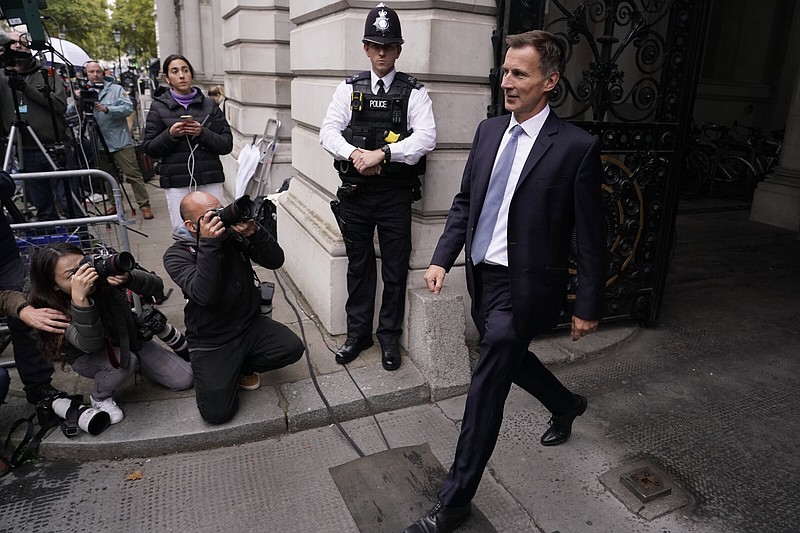LONDON -- British Prime Minister Liz Truss sacked her Treasury chief Friday and reversed course on a major part of her tax-cutting economic plan after weeks of financial market turmoil.
But the markets' response was muted, and the political reaction to what many saw as panicked moves left Truss' credibility in tatters after only six weeks in office.
At a hastily arranged news conference Friday, Truss said she was acting to "reassure the markets of our fiscal discipline" by ditching her pledge to scrap a planned increase in corporation tax.
Earlier, she fired her close friend Kwasi Kwarteng as head of the Treasury and replaced him with Jeremy Hunt, a long-time lawmaker who has served three previous stints as a Cabinet minister.
Truss is trying to restore confidence and rebuild her credibility with international investors and members of her own party after the "mini-budget" she and Kwarteng unveiled three weeks ago sparked political and economic turmoil, even drawing rare criticism from the International Monetary Fund.
The government's Sept. 23 announcement that it planned to cut taxes by $50 billion without detailing how it would pay for them or offering independent analysis about the impact on public finances raised concerns that government borrowing could rise to unsustainable levels.
That sent the pound plunging to a record low against the dollar and forced the Bank of England to step in twice to prevent a wider economic crisis.
Truss has now canceled about $22 billion of the originally planned tax cuts. But her brief, downbeat news conference Friday proved unlikely to have reassured Truss' Conservative Party that she remains in control.
"I think she's just confirmed that she's not the right person for the job," said Tim Bale, professor of politics at Queen Mary University of London. "I don't think it communicated the kind of confidence the country needs right now."
Despite backtracking on a major part of her program, Truss clung to the idea that her policies were what the country needs to spur economic growth.
She also avoided repeated questions about why she should remain in office when Truss and Kwarteng were equally responsible for the government's economic plan and the fallout it triggered.
"I am absolutely determined to see through what I have promised," Truss said.
U.K. MARKETS STILL TROUBLED
Despite Truss's efforts, the move Friday failed to fully soothe investors: The British pound again fell, and recent gains made by the Bank of England buying government bonds through Friday were reversed.
The pound was more than 1% weaker against the dollar Friday, after rising more than 2% on Thursday. The British currency rose slightly after Truss announcement but weakened again after her news conference.
Yields on government bonds, an indicator of government borrowing costs, were rising, with 10-year yields at 4.2%, after falling to as low as 3.9% earlier in the day.
While signs of a retreat by the government have offered some relief to markets this week, it leaves the government's economic agenda in tatters and Britain without a clear path ahead while inflation is at its highest level in four decades and household budgets are squeezed by rising energy bills, higher mortgage rates and other rising costs.
Data published this week showed that the British economy unexpectedly shrank in August, adding to expectations that Britain is headed for a recession.
"We might get the U-turns, but what else?" said Jane Foley, a strategist at Rabobank Group of Netherlands. "What can any chancellor now do to dig the U.K. economy out of the hole that it's in?"
The pound was trading below $1.12, lower than where it was before the government's policy statement Sept. 23. Bond yields were still significantly higher than they were before the statement.
The pound is still a vulnerable currency, Foley said. "Even though we may have pulled back from the abyss," she added, "we're not in a positive position."
The next big test for Truss will come Monday when trading resumes on financial markets. The Bank of England ended its emergency intervention Friday to stabilize long-term bond prices and protect pensions funds.
"Whether or not she remains prime minister, her whole agenda now, her ability to pursue her political project, if you like, is really out of her hands," said Jill Rutter, a senior fellow at the Institute for Government, a London-based think tank.
"Her fate is now in the hands of the markets," Rutter added.
Information for this article was contributed by Eshe Nelson of The New York Times, and Danica Kirka and Jill Lawless of The Associated Press.
